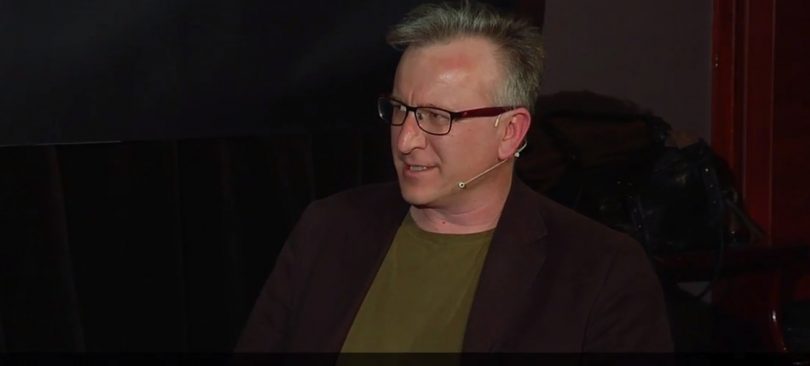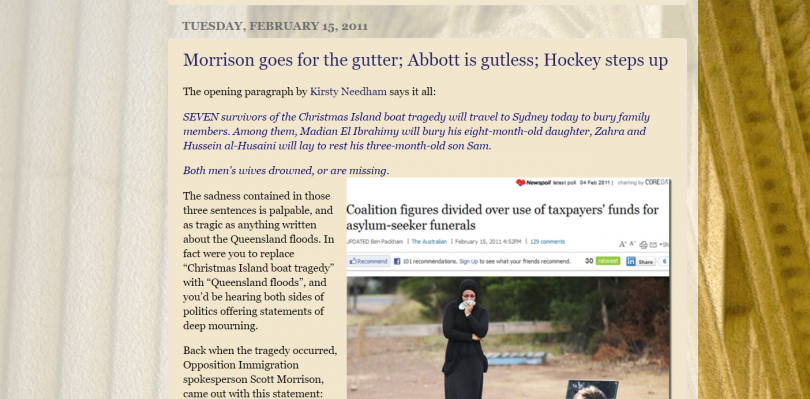
Former public servant Greg Jericho caused a stir in 2010 when it was revealed that he was the writer behind political blog Grogs Gamut. Photo of Jericho during an interview: Youtube.
Public servants are pondering over the High Court’s decision to uphold the sacking of Michaela Banerji for anonymous social media posts that criticised the Government’s immigration policy.
But this watershed moment might never have occurred if it wasn’t for a political blog a decade ago, and the former public servant behind it is happy to take some of the blame for the tougher Code of Conduct and social media guidelines for public servants.
In 2010, The Australian revealed that the writer behind Grogs Gamut – an anonymous, provocative political blog, was Jericho. The blog included posts berating the Labor party’s asylum seeker policy, with headlines that called Opposition leader Tony Abbot “gutless”.
The now Guardian journalist managed to keep his job in the Department of Environment, Heritage, Water and the Arts after his department found that he had not written anything that was confidential or about his area of work.
“Unfortunately for public servants, the APS’ Code of Conduct and social media guidelines were probably changed because of what I did and the attention that I got,” Jericho told Region Media. “When I started blogging in 2008, I was aware of the Code of Conduct, as all public servants are.
“I chatted with a couple of friends who were lawyers in the public service and we found that there was no barrier to me writing my blog.
“I always made sure that I adhered to the Code of Conduct and subsequent reviews by the department found that I had. I was always very careful not to write about things within my purview and work area, which is pretty much what saved me.”

A screengrab of a post from Grogs Gamut on 15 February 2011.
A year after he left the public service, the APS Commission introduced new guidelines for public servants’ social media use in 2012.
The new guidelines were dubbed by some as “the Jericho amendments”, which included changes that precluded public servants from making comments online in a private capacity that are “so harsh or extreme in its criticism of the government, a member of parliament from any political party, or their respective policies, that the employee is no longer able to work professionally, efficiently or impartially”.
These and other additions to the APS’ Code of Conduct were cited by the High Court in its unanimous decision to uphold the sacking of Canberra woman Michaela Banerji.
The High Court’s decision has raised concerns about the balance between free speech and an impartial and effective Government administration, a balance that has been lost according to Jericho.
“The new guidelines are now restricting normal social media life,” he said. “It is stopping people from sharing things that they find interesting, from liking a post or clicking attending on an event.
“They have really tried to kill the headache by cutting off the head, is how I would put it. They have gone too far.
“It has not ensured the integrity of the public service is maintained, but it has just served to cower public servants into not participating in what others consider normal life.”
The real concern for many public servants is that, similar to the Banerji case where her colleagues outed her to her department, personal social media use can now be used as a reason to terminate employment, regardless if they are effective in the workplace.
“The consequence of these guidelines is that it gives departments and supervisors the ability to use an employee’s social media life for personal reasons,” Jericho said.
“If you have a work conflict with someone, there is now the opportunity for departments and supervisors to go through someone’s social media and find reasons to discipline them when there is nothing actually wrong with their work.
“I am certainly aware of incidents where that has occurred and where people are worried about it occurring.”
Original Article published by Lachlan Roberts on The RiotACT.








